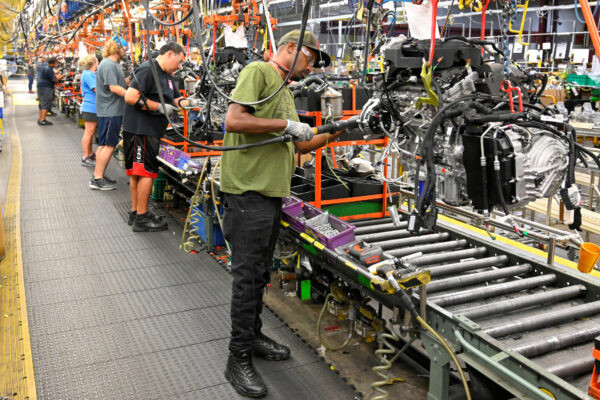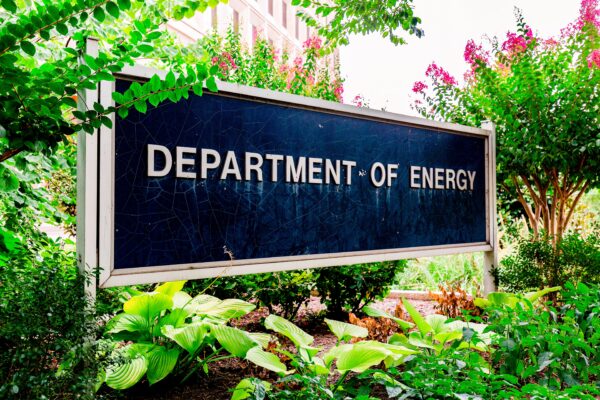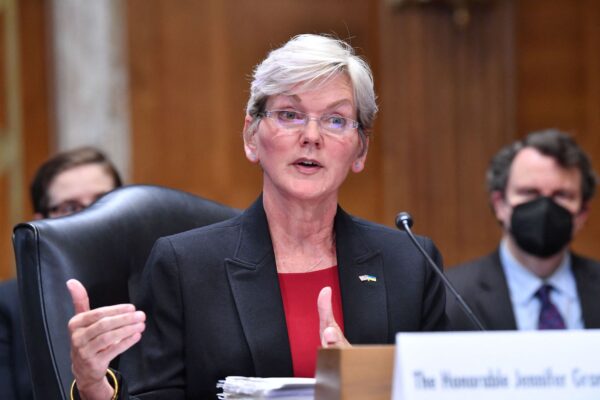
The U.S. Department of Energy (DOE) was never quite clear on why it allowed a Texas subsidiary of a Chinese-owned battery manufacturer to qualify as a grant applicant, even after the company’s links to the Chinese Communist Party (CCP) were revealed during the department’s own vetting process.
The DOE was equally opaque in curtly announcing on the evening of May 22 that it had reversed its decision and that Microvast Holdings is no longer qualified to apply and negotiate for grants under the 2021 Bipartisan Infrastructure Law (BIL).
“As responsible stewards of American taxpayer dollars, the Department of Energy maintains a rigorous review process prior to the release of any awarded funds, and it is not uncommon for entities selected to participate in award negotiations under a DOE competitive funding opportunity to not ultimately receive an award,” the DOE said in a May 21 statement that left more questions than answers.
In a May 22 phone query to the Department of Energy seeking elaboration, The Epoch Times was asked to pose its questions in an email. The department responded three hours later in a statement clarifying that Microvast was never approved to actually receive a grant, only to begin preliminary negotiations to apply for one.
“One important note of clarification is that DOE did not ‘cancel’ a grant,” the Department of Energy said in its statement to The Epoch Times. “The company was selected for an award and going through contract award negotiations. No money has gone out the door. It would be inaccurate to say ‘DOE canceled a grant’ or that ‘DOE pulled back an award’ as no award has been provided.”
As of deadline, Microvast did not respond to phone calls or an email seeking comment.
Also seeking answers, House Energy and Commerce Committee Chair Cathy McMorris Rodgers (R-Wash.) told the Oversight and Investigations Subcommittee that she invited the DOE to the panel’s May 23 meeting, but no one showed.
“The department’s refusal to participate in the hearing is even more concerning in light of this development,” she said, facing empty chairs before her. “I’m concerned that the department may be entertaining other problematic awards and only decided not to proceed with this after our congressional scrutiny.”
Rep. Frank Lucas (R-Okla.), the subcommittee chair, praised DOE for “its increased scrutiny of the Microvast award” and said he had invited DOE Office of Manufacturing Director Steve McKnight to testify at the hearing so “he could have delivered the good news in person.”
But, alas, no dice, he said, nodding to the empty seats.
“Unfortunately,” Lucas said, “they refused to come before us, citing inadequate notice despite receiving an invitation to testify on May the 9th.”


The Microvast saga began last year when it was qualified to apply for grants following the November 2021 adoption of the $1.2 trillion Bipartisan Infrastructure Law, which offers $62 billion in federal money for companies to participate in 72 research and development programs—including 60 new ones—designed to foster domestic energy independence.
Among those new DOE programs is a $7 billion initiative to develop the nation’s lithium battery materials processing and component manufacturing capacity. China currently controls about 90 percent of the global market in raw lithium and batteries.
During a two-hour Feb. 2 discussion on the status of BIL programs with DOE Deputy Secretary David Turk, the Senate Energy and Natural Resources Committee questioned whether the Department of Energy’s vetting process was adequate, not only to prevent fraud and reduce waste, but to ensure U.S.-based subsidiaries owned by Chinese companies—and other adversarial nations—are not cashing in on the taxpayer-funded bonanza.
The case in point for senators was Microvast Holdings, founded in 2006 in Houston and now headquartered in Stafford, Texas, which makes lithium ion batteries for electric vehicles—mostly buses—and energy storage systems.
The company operates manufacturing plants in Germany and Texas. It also has research and development office in Orlando, Florida, but most of its presence is in China, where its corporate headquarters is in Huzhou.
In October, the DOE announced that Microvast was among 20 companies selected from more than 200 applicants to apply for a $200 million grant to manufacture lithium batteries at a plant it wants to build in Tennessee, sparking alarm and criticism from congressional Republicans, including Sen. John Barrasso (R-Wyo.), ranking member of the energy committee.
During the February hearing, Barrasso grilled Turk about how deep the Department of Energy’s scrutiny goes when open source financial data shows that 69 percent of Microvast’s income is in the People’s Republic of China, with its U.S. operations accounting for about 3 percent of its total revenue.
“This company’s filings with the Securities and Exchange Commission (SEC) reveal very troubling connections to the communist Chinese government,” Barrasso said. “One filing states, ‘The People’s Republic of China (PRC) exerts substantial influence over the manner in which we must conduct our business activities and may intervene at any time and with no notice.’
“The company goes on to state,” he continued, “‘we may not be able to protect our intellectual property rights in the PRC.’ Now we know the DOE has funneled hundreds of millions of dollars to a company that publicly admits it is at the beck-and-call of the Chinese government.”
Microvast was “selected to negotiate an award,” Turk said, but “there are no taxpayer funds going to Microvast or to any of the other 20 companies right now” that were selected to be considered for the program.
“They were selected to participate in a negotiation for an award,” he said, explaining the selection is essentially a preliminary first round that “triggers for us an extended due diligence process where we look into” a company’s details “and we also verify the accuracy of the information” they provide.
Turk said the Department of Energy is trying to quickly allocate money to get needed projects off the ground while developing oversight guardrails “to make sure we are doing it right, to make sure we are being smart and [with] eyes wide open.”
He said before the Senate panel in February that the competitive bid process has been enhanced by “a realignment to enhance oversight” that includes “an extensive merits review process done by civil servants” with “industry experts to provide guidance” in analyzing companies bidding for federal money.
The DOE is “continuously improving that process to ensure our civil servants have that geo-strategic perspective of what we are trying to do here,” Turk said, adding that there is now “also a robust process where we get intelligence officials” involved in the vetting.
To qualify for federal funding, a company must “be a domestic entity incorporated in the U.S., with a majority domestic ownership and control, with a physical place of residence in the U.S.,” he said. “The other specific requirement is any person participating in a foreign government-sponsored talent recruitment program [is] prohibited from participating in any federal funded program.”
Turk said under the Bipartisan Infrastructure Law, the Department of Energy can hire an additional 500 staffers. The department has thus far hired “400 new staff with contracting expertise” to more quickly and intensively review contracts and bids.


In its May 23 statement to The Epoch Times, the Department of Energy further elaborated on its grant selection process.
“In determining whether to proceed to final award with a selectee, the Department evaluates a great number of factors, including but not limited to: the fitness of the applicant to carry out the scope of its responsibilities under the financial assistance award; applicant past performance including audit reports; applicant financial management; accounting systems; and duplication of funding,” it said.
The DOE assured the vetting process requires grant applicants to “disclose a significant amount of sensitive information to the Department” during the application and negotiation process, it said.
But that’s all it would say.
“The Department cannot comment publicly on the specific factors that inform a decision to cancel negotiations with any particular applicant,” the Department of Energy said.
Congressional representatives in both parties have raised issues with the Microvast’s grant application for more than a year, gaining in volume and concern after the company was placed on the SEC’s watchlist in April 2022 for its China entanglements.
But until earlier this year, the Department of Energy contended that the company was an American business and that its grant vetting process would uncover any worrisome connections to China or elsewhere.
Which, apparently, it did, but long after most had reached that conclusion, and without—at least not yet—explaining how the vetting process confirmed that Microvast may not be suitable to receive U.S. taxpayer money.


Lucas, in a series of May 23 statements posted on Twitter, called DOE’s reversal “a huge win for taxpayers and American businesses. These funds are intended to strengthen America’s battery production and supply chain, not to tighten China’s stranglehold on these supplies.”
But the story isn’t over he said, at least not until the Department of Energy speaks.
“I’m pleased with DOE’s decision, but incredibly frustrated that it took the Department six months and multiple letters from our Committee to come to such an obvious conclusion,” Lucas said. “We’ll continue to hold the Administration accountable for its funding decisions and ensure that American taxpayer dollars are protected from exploitation by the CCP.”
“I stood with my colleagues against @ENERGY awarding Microvast $200M in grant funding — that’s now canceled. This is a MAJOR win for our hardworking taxpayers,” agreed Rep. Brandon Williams (R-N.Y.) in a Twitter post.
Barrasso, in a statement, said he felt vindicated but frustrated by the DOE’s lack of communication and the Biden administration’s dithering over something that should have been resolved quickly.
“The Department of Energy has finally retreated from sending U.S. taxpayer dollars to Microvast, an electric vehicle battery company with close ties to Communist China,” he said in a statement.
“I’m stunned it took the Biden Administration this long to admit the obvious: no company beholden to Communist China should be considered for U.S. government grants or loans,” Barrasso added. “The administration should immediately reject other applicants with similar ties. It should also overhaul its grant making process and conduct due diligence before issuing press releases.”
For Microvast, the news didn’t get any better the morning after the Department of Energy’s evening announcement with the publicly traded company’s stock declining by 24.1 percent as trading opened May 23.
The company plans a May 25 Investor Day in New York, where several people are expected to speak, including Microvast Founder Yang Wu; Chief Revenue Officer Sascha Kelterborn; Energy Division President Zach Ward; Chief Operating Officer Shane Smith; Chief Technology Officer Dr. Wenjuan Mattis; and Chief Financial Officer Craig Webster.




Discount Applied Successfully!
Your savings have been added to the cart.